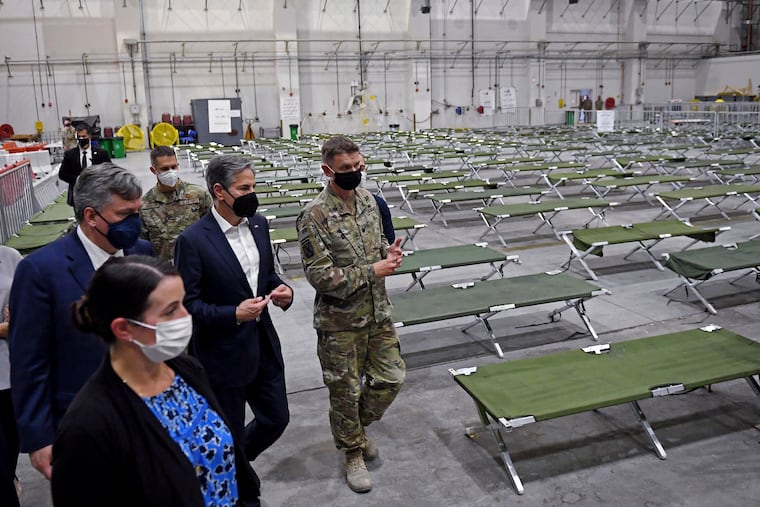Secretary Blinken, don’t betray Afghan partners and the U.S. vets trying to rescue them | Trudy Rubin
The State Department is blocking private charters organized by veterans to evacuate Afghans who worked with the U.S. military.

Is Secretary of State Antony Blinken really planning to abandon thousands of Afghans facing prison or death because they helped U.S. troops? And to block groups of dedicated U.S. vets who are trying to save them?
Right now, the answer to both questions appears to be YES.
In June, Blinken spoke to Congress about granting more than 18,000 special immigrant visas (SIVs) to Afghans who had worked with the U.S. military. Legislators and Pentagon officials urged him to evacuate them before the U.S. exit. He chose not to do this.
Most SIV applicants didn’t get out during the chaotic evacuation. Their IDs are on lists seized by the Taliban from abandoned U.S. bases.
» READ MORE: Afghans who helped U.S. face Taliban revenge if we don't save them | Trudy Rubin
Their only hope is provided by volunteer groups of ex-U.S. Special Forces, intelligence and aid workers, and humanitarians, with names like Task Force Argo, No One Left Behind, Task Force Pineapple, and dozens more, who rely on private donations.
Some volunteer groups have raised enough funds to evacuate endangered Afghans on charter flights from a northern Afghan city to third countries, where SIV candidates can complete the vetting for a U.S. visa. But the State Department, which has to sign off on charter manifests, is blocking most flights.
Task Force Argo has flown five flights out, rescuing 2,126 Afghans including 61 U.S. citizens. But three more of the group’s charters — along with those of other veterans’ groups — have been on hold for weeks.
The reason: Blinken’s State Department has tightened requirements on which Afghans it will help. When it comes to SIV applicants, State will sign off only on those who already have fully completed SIV visas in their passports.
A department spokesperson tells me that’s because they want to ensure that Afghans on the charters are eligible for ultimate resettlement in the United States. But there’s no way that thousands of Afghans stuck in mid-process can now complete an SIV application inside Afghanistan, given that the U.S. Embassy is shuttered. “It’s impossible,” says Zach Nunn, an Air Force veteran and cofounder of Task Force Argo.
The State Department is effectively telling these Afghans to whom we made promises: “Tough luck.”
The Task Force Argo charters would have landed in the United Arab Emirates or possibly the state of Kosovo, where the State Department could have conducted visa vetting. The veterans even did their own diplomacy: Nunn, an Iowa state senator, met with top Kosovar officials visiting his home state, which is the “sister state” of Kosovo.
The State Department’s reluctance to approve charters is already having dangerous repercussions. Task Force Argo has been paying for safe houses for thousands of endangered Afghans until they are evacuated. With the flights blocked for months, the group is running out of funds for housing. It is fund-raising urgently but has had to ask many safe house residents to leave.
That could spell death for N, an IT specialist who worked with Americans at Kandahar Airfield and with whom I am in touch via a messaging app. (I use only his first initial because he is in serious danger.) His lawyer wife and jurist father also worked with U.S. military contractors, and all are midway in the SIV process.
N and his father are being sought by name by the Taliban. The family came close to death when the Talibs stopped them on the road as they escaped by taxi from Kabul. When the Talibs asked for their identification, N’s wife whispered to her disabled mother-in-law and her small sons to start screaming that grandma was in terrible pain and dying. Unnerved, the Taliban let them go.
Returning to Kabul would be fatal for the family. N’s only hope is to be flown out soon on a private charter to a third country. Yet current State Department policy rules that out.
The blocking of charters is also devastating veterans working to keep U.S. promises to Afghans. “We are handing out suicide prevention numbers to our [U.S.] handlers,” says TF Argo cofounder Jesse Jensen, a retired U.S. Army Ranger.
“It takes a toll on folks when the rest of the country has moved on and we’re the ones left holding the bag.”
» READ MORE: President Biden, get our Afghan allies out on evacuation planes | Trudy Rubin
A State Department spokesperson tells me the department has “established a team [known by the acronym CARE] to coordinate across government agencies and with advocacy groups” in helping endangered Afghans.
But veteran groups and legislators complain they can’t figure out what CARE is doing and have received no clear guidelines on how it works.
Veterans’ groups want clear and more generous rules for whom the State Department will accept on charters. The SIV process should be genuinely streamlined. More “lily pads” — third countries where evacuees can be vetted for visas — are needed.
Most of all, vets want better support for volunteers, who are doing a job that rightly belongs to the State Department. That support requires a solid, well-staffed and transparent coordination agency that helps, not hinders, private efforts.
It is unconscionable that a secretary of state whose family narrowly escaped death in the Holocaust would betray Afghans whom we promised to save from the Taliban, along with veterans trying to help them.
The burden for keeping America’s promises rests on your shoulders, Secretary Blinken, not theirs.